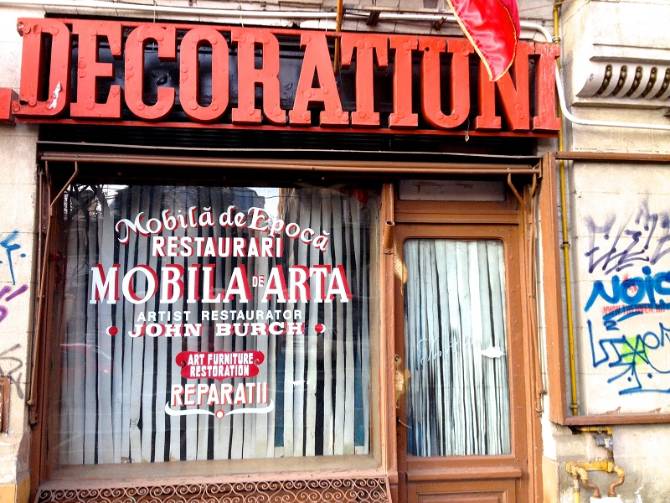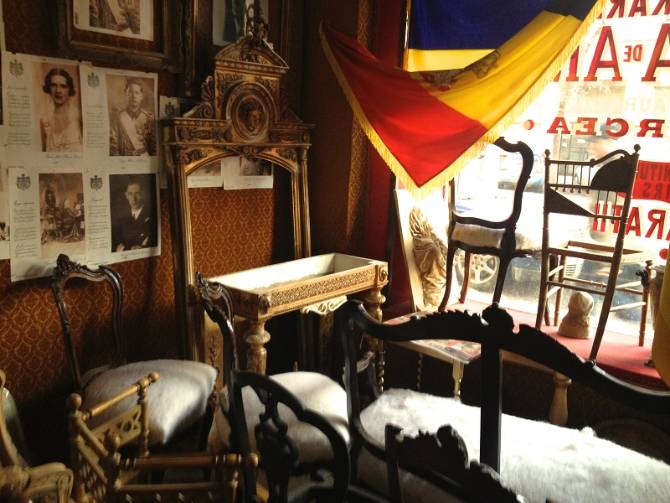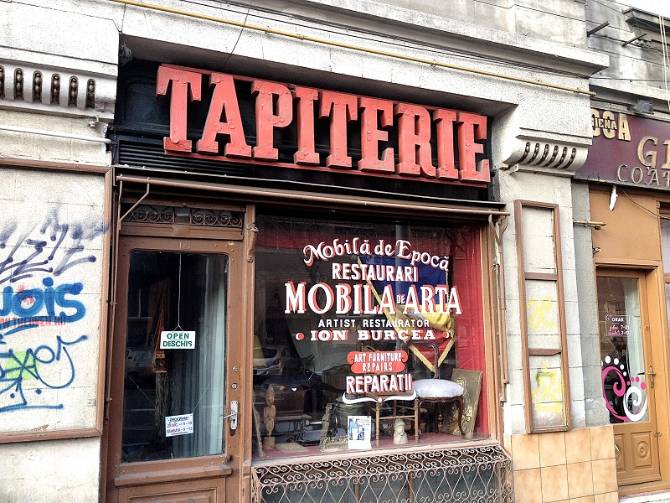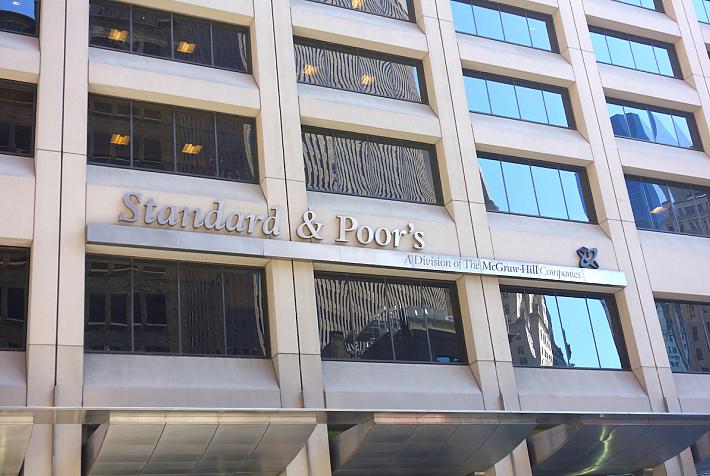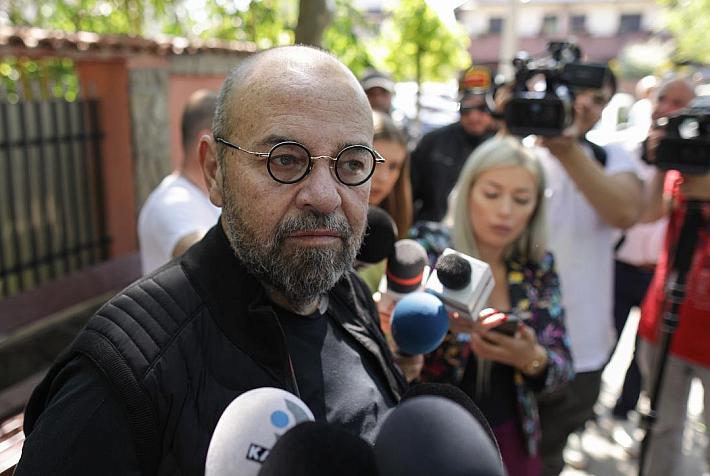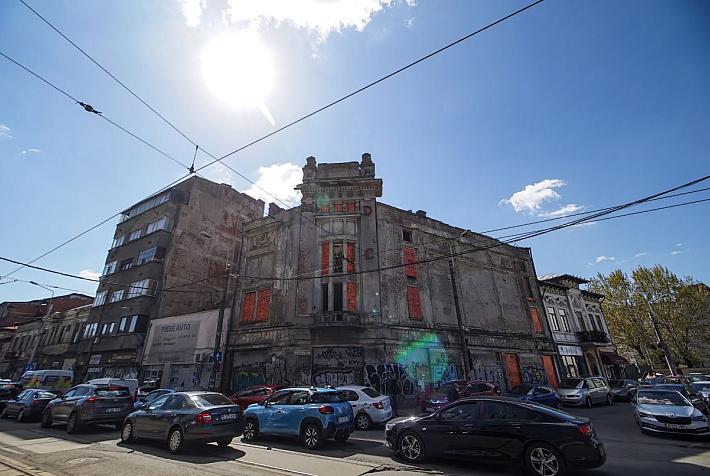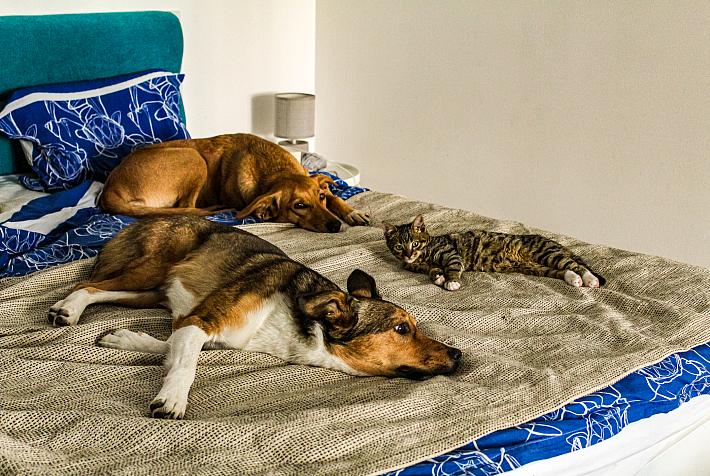A portrait of the artist as an old man, hidden downtown Bucharest
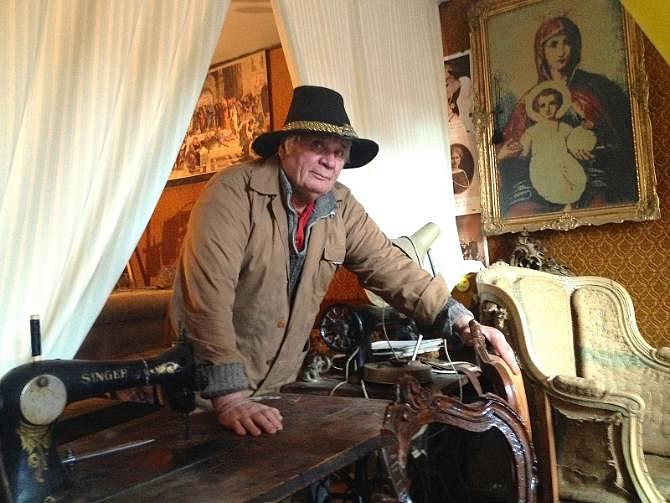
In his small studio in downtown Bucharest, Ion Burcea has been refurbishing old furniture for the last 50 years. He loves the sun and laughs authority off. He is also called John Burch.
Piata Rosetti, a small square in downtown Bucharest, is located only 250 metres away from Piata Universitatii and has always been in its shadow. Big historic events have taken place in the Universitatii square; among them the 1989 Revolution, the miners’ uprising, subsequent protests. Important buildings such as the Bucharest University or the Intercontinental Hotel are located there. But hidden from history’s big events, Piata Rosetti has managed to remain a place where time doesn’t just fade away.
Ion Burcea’s studio is one of these places in Piata Rosetti, which hasn’t changed in the last 50 years: a small workshop, where old furniture has been patiently refurbished over the years. However, the man inside has changed. From the 20-year man who crazy about dancing events and beautiful suits, and worked over twelve hours a day and then run into the city, to the 70-year old man, who is still working long hours in his studio. This time with white hair and a taste for solitude. His name is Ion Burcea, as stands written on one of the studio’s doors. But he is also known as John Burch, the name written on the other door.
It’s mid-January and cold doesn’t seem to go away yet. “I don’t like winter. It gives me a bad mood,” says Ion Burcea. I came to meet him and ask him if he’d like to give an interview. One of his studio’s walls is covered with articles cut out from newspapers. They are all about him, about the “old man and the furniture”, as one title reads, probably referring to Ernest Hemingway’s story “The old man and the sea.” He has received some attention from the media over the years, but he doesn’t seem very willing to engage in a new interview.
He seems an old, grumpy man. But as we get to talk a bit, a little smile sneaks onto his face. “Kids go by my studio all the time, laughing, cursing, talking out loud. There is a school nearby. And they look inside and make jokes about the old devil. And when they finish school and go back home, they still see me here, working. They don’t get it, what do I do here all day long? Once I played along and pretended to really be this old devil that makes scary faces at them. They all laughed and we became friends. They now wave me every time they go to school and I wave them back.” We agree that I will come back next week for the interview.
Seven-days fast forward and the sun is back in the game. I enter Ion Burcea’s studio a bit hesitantly. “Hello,” I greet him. “Hello,” he answers back, but it’s obvious that he’s not very happy to see me. “So, winter is gone,” I say. “Yes, wonderful,” and his face lightens up. “Sun is life. The dark, cold weather smells like death”. A woman and a small child pass by the studio. As for the interview, “let’s meet on Monday,” he says. That’s in three days. He obviously doesn’t like the interview idea, but at least he says yes.
It’s Monday afternoon. The TV is on, announcing new charges for corruption crimes. One of the most notorious women in politics, recently accused of corruption, says in front of the cameras that all country’s prominent political men have hidden under tables. Her face covers the whole screen, a bit blurred by the snow on the channel. Ion Burcea, dressed in an old robe, is refurbishing an old-looking coach. “Not very old, from the communist period.” Undressed from its cloth, this naked coach doesn’t necessarily resemble a sofa. It looks almost abstract. It’s a mass of yellow down, filled with stitches. Burcea patiently moves around, like a surgeon near an open body.
He grew up among pieces of furniture and embroidery, in a house with a backyard, in Rahova, in eastern Bucharest. While his mom was doing needle-points with peasant girls, small dogs and shepherds and his dad was making and refurbishing furniture for a living, the young Burcea was discovering wood. He created airplanes, scooters and bearings out of wood planks he’d find in the yard. When he finished seventh grade, he started learning the trade. He gets really upset now when he hears somebody saying ‘that person taught you. “Somebody can show you how to do something once or twice, but in the end you need to learn by yourself, take notes, undo everything to see how it was made. You need passion.”
“I never got bored while doing this. Boredom? What is that? I hear people saying, ‘why don’t you retire? Aren’t you tired?’ But do you want me to die? That’d happen if I retired. I am not the person that can sit all day long on the balcony spying on his neighbors.”
He started working in this studio in 1967, when he was 20. “A young lad,” I say. “And a handsome one,” Burcea adds laughing, “My mom liked to brag ‘my big, beautiful boy.” I ask him how was life back then. “Beautiful!” he shouts, in a burst of enthusiasm. “I worked all week and then on Saturdays I went to the public bath, that had swimming pool and dry and wet saunas, then to the barber, to get my manicure done.” He shows me a picture hanged on the wall, where a 22-year old Ion Burcea, wearing a bow-tie, looks proud and happy. “I had a fantastic youth! But I knew how to make it so!”
“I had 14 suits. The first one I got it when I was 12 and my parents stood as godparents. But when I started working I bought them.” In 1965, he entered the Craftsmen Cooperation, which assigned him to this workshop in Piata Rosetti two years later. There were 14 people working in the studio, mainly for export. 80% of their activity meant making new furniture. “We only seldom refurbished old furniture. This kind of work takes a lot of time. The communists had a norm, a plan and you couldn’t afford losing time.” People rarely brought their old furniture to be refurbished for fear of being called ‘bourgeois elements.'
Working in his studio, with his TV on, which sometimes drives him crazy, for all the stupid things they say, Burcea has had a different kind of TV turned on for decades. He has had a direct view of the boulevard and of the thousands, maybe tens of thousands of people that have passed by. I ask him how the view was 30, 40 years ago. “People were well-dressed, nobody was cursing or tossing their cigarette ends. Oh..and, the girls were lovely. We were going to dances Saturdays and Sundays. Young people don’t know how to have fun now. They only get drunk. But we were really dancing back then!”
“I was organizing dancing parties myself. I had bought a Tesla tape recorder. It was damn heavy so a friend was helping me to carry it to various apartments where the dancing parties took place. I probably had 30 magnetic bands with Elvis Presley; with American bands, jazz, Italian music, Gianni Morandi, Charles Aznavour. The cream of the music.” Then he makes a short break and adds. “The music today? I don’t like it!” “My friends liked booze and were getting the girls drunk. But me? I was dancing all night!”
Every morning he came to work dressed in a suit, then changed to working clothes and at the end of the day, he suited back up. “Now it’s the same. I’m coming to the studio wearing a long, black coat, a black hat and if it rains, a black umbrella. ‘Where do you go dressed up like that?’ somebody may ask me. And I say, to the theatre. ‘What theatre?’ the person replies. And I point to my studio.”
“After ‘90, people were saying, ‘boss, it’s democracy now, we only work 10 hours a day’. They were all gone by 5pm, but I stayed all day long. There was so much work, enough for the entire year! People timidly started bringing their old furniture. Refurbishing is a heavy job. You need a lot of patience. But to be honest you can’t pursue anything unless you have patience…and passion. This craft is endangered, it will disappear soon. It’s badly paid and people now want to make money quickly and fast. And there is not much old furniture left in Romania. They filled wagons and wagons with antique furniture after ‘90 and took it out from the country. 80% of it went to Yugoslavia, where it was refurbished and then sold to Germany or the Netherlands.”
He remained alone in the studio after 1993. And that’s how his days pass by ever since. “Don’t you mind loneliness?” I ask him. “Oh, loneliness is extraordinary,” he answers. “I have time to think. For example, if I go out for a beer with a friend, he starts chatting, and I just get lost in my thoughts.”
Right then, the doorbell rings and a shy, quiet man enters the studio; an old friend. “I was going to the polyclinic to get some eyedrops for my wife and I thought I should pay you a short visit. I visited you at noon last week, but you weren’t here.” “At noon? well...after I eat, now that it’s getting warmer, I take a walk, admiring the old houses.”
“What’s this, a crib?” the friend asks, pointing to the couch.” “No, it’s a couch”. They chat a bit about what’s happening in the politics. “I will come back the following days” says the friend and leaves the place as inconspicuously as he entered it.
“That’s why I prefer to be alone,” he whispers after the man leaves.
Even if he enjoys the solitude, he also likes his friends, their companionship. That’s how the John Burch story came about. It was the fall of 2002 and George Bush was about to pay a visit to Romania. Burcea was in the Old City with a friend drinking beer and they thought, what if Bush drives by the studio in Piata Rosetti? What if the convoy stops and sees the name John Burch? They might believe it’s an American living there. “I have a friend who writes on storefronts. I called him the next day, told him the story. He laughed and said, “sure, Ioane, it’s a deal.” This is how Ion Burcea translated his name on his storefront.
George Bush’s convoy probably didn’t pass by Ion Burcea’s workshop. At least they didn’t stop to ask about the American living there. But other people in Bucharest pass by the store every day and see the two names written on the storefront.
“One day a BMW pulled over and a bold, big guy got out of the car and entered the studio,” Ion Burcea says. “He didn’t look at me, nor said hello, like I didn’t exist. He just said, ‘I have some furniture to refurbish, how much does it cost?’ And I said, ‘oh, I am very sorry, I can’t help you. Only my boss John Burch knows the price, but he’s in another country now. I am just an employee.” The guy insisted for a phone number; he got one, but every time he called back, he received the same answer. “Oh, I am very sorry, but he still didn’t come back. John Burch is a very busy man.”
“If I’m serious, it means I’m sad.”
“What makes you sad?”
“Everything that is against honest work. They all want money without working. I told my son that when I die, I want him to put my tools in my grave. I want to open a store up there. Maybe God has something to fix. He replied: Dad, have you gone nuts? But if you take everything too seriously, you just go crazy.”
Last summer he took a little table and an umbrella outside his workshop, put it on the sidewalk and drank some coffee and tea. Two policemen came by and asked for his ID, his name. Ion Burcea pointed to the showcase. “It’s written there”. “Sir, please, your name, your birth date.” One of them then called a number, gave Burcea’s identification dates and after 30 seconds said. “It’s alright!” “But could you please tell me what has all this meant?” “It was a routine control.” He burst out into laughter as he is telling me the story. “Routine control. And I was only enjoying my coffee!”
By Diana Mesesan, features writer
(photos by Diana Mesesan)






